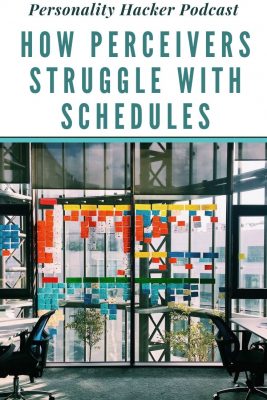Download Episode Here – right click link and select “Save Link As…”
In this episode, Joel and Antonia talk about the struggles Perceivers have with schedules.
In this podcast you’ll find:
- Scrum Board
- Schedule vs. rhythm
- Judgers create the schedule first then the rhythm comes from the schedule
- But for perceivers, we suspect the rhythm comes first, and the schedule evolves around it
- Perceivers can get unrealistic about how much they can get done at any given time, so they struggle with sticking to a schedule.
- They will abandon schedules because they never seem to work.
- When you have an extraverted Judging function higher up in your stack, it is easier for you to keep track of what is happening over a long period of time.
- EPs fixation is unfettered freedom, so schedules can feel like life has no color.
- They may unconsciously sabotage a schedule to maintain their freedom.
- Judgers put a schedule to paper, and it becomes their motivation.
- To check it off the to-do list.
- Perceivers hate To-Do lists.
- Schedules facilitate you to do the things you want to do.
- All of us have stuff we don’t want to do, but it’s the best way to get something done.
- Perceivers – Make peace with your schedule.
- Schedules don’t have to hurt.
- Find what works for you and craft your schedule around it.
- Schedules are a platform for opportunity.
- When you are trying to figure something out, you aren’t sure which rules you can break.
- So, Perceivers may often look more militant about maintaining schedules than Judgers because they don’t know how to adapt if something goes wrong with their schedule.
- Perceivers can tend to forget what they accomplish, too.
- Celebrate the things you accomplish.
- Create anchor events for yourself that are non-negotiable then fit the other things around the anchor events.
- Anchor events may not happen until you find your rhythm.
- Perceivers – Make peace with the schedule and go with the rhythms of your life.
- Go to bed at a decent time, so you have more energy to accomplish things.
- Drink plenty of water
- Exercise
- Eat nutritious food
- Put your shoes on every day
- Judgers need to make sure they don’t have too much energy sapping things in their schedule
- When they were designing Disneyland, there was a patch of grass people kept cutting through, so Disney told them to pave it and create a path.
- Judgers create this Stay off the Grass situation and force themselves into a schedule that isn’t energy efficient.
- Judgers – make sure you aren’t wasting time and effort by shoe-horning yourself into a schedule that is too arduous.
To subscribe to the podcast, please use the links below:
Subscribe with iTunes
Non-iTunes Link
Soundcloud
Stitcher
Google Play
Spotify
Radio Public
PlayerFM
Listen Notes
If you like the podcast and want to help us out in return, please leave an honest rating and review on iTunes by clicking here. It will help the show and its ranking in iTunes immensely! We would be eternally grateful!
Want to learn more?
Discover Your Personal Genius
We want to hear from you. Leave your comments below…



Share:
Podcast - Episode 0295 - Food Choices And Personal Growth
Podcast - Episode 0297 - Cognitive Functions And Time
33 comments
Drew,
You theory sounds like a good one. I can see that trend possibly being true. I wonder if introverts are more likely to go under the radar and not look hyperactive compared to an extroverted kid with ADHD? There might be a pattern there for E’s trending toward ADHD with predominantly hyperactivity and I’s with ADHD with predominantly inattentive.
I’m an INFP, and I resonate completely with the struggles you describe here. My desire to accomplish something important is always in conflict with my need to have freedom so I can be spontaneous. And if nothing spontaneous happens, it frustrates my yearning to accomplish.
It looks like I’m not at all the only INFJ who resonated with some of the “perceiver struggles” outlined in this episode! I had a hell of a time actually settling on INFJ as my type because I thought there was absolutely no way a judger would have such a hard time getting her sh*t together.
Of course a huge factor for me is that I have very severe clinical ADHD that went undiagnosed until about four years ago, when I was 20. That in conjunction with this episode brought up a thought that I have approximately zero evidence to back up: I wonder if perceivers and judgers have very different ways in which their learning “disabilities” present themselves. Until very recently doctors differentiated between Attention Deficit Disorder with and without hyperactivity. I would bet that the more stereotypical “disruptive ADHD kid” would more often be a perceiver, while the people with ADHD who simply can’t get it together and “fly under the radar” would be judgers. It would make a lot of sense to me, since perceivers gather information from their surroundings, while judgers use slower, post-processing methods to learn.
This concept of “the rhythm creates the schedule” is new to me. It relates to the idea of chronotypes, which I recently learned about. Chronotypes come down to energy management. Basically there is a spectrum that has on both extremes larks (people who work best early in the morning) and owls (people who work best late in the evening). 14% of people are pure owls, 14% pure larks, and the other 65% are between the two (these figures come from the book “When” by Daniel Pink). The world around us is more adapted to larks.
By figuring out when you perform the best on certain kinds of tasks, you can modify your schedule as much as possible to optimise the energy peaks. If you can’t modify it that much, taking frequent breaks when you have low energy makes a big difference. It helped me concentrate better when I had a job and every day between 2 and 5 pm I had an attack of exhaustion.
ENFP – loved this podcast. You know what I’m desperate for? A similar podcast on the to-do list. Not unlike a schedule, it’s a tool that I know can work in my life. (And in fact the interaction between to-do list and rhythm/schedule is a super-sophisticated aspiration). But man,it’s a constant source of stress and starting over and sometimes meticulously maintaining the to do list (so much time maintaining it and making it colorful and awesome that I don’t actually do the shit that’s on it) — or I just make it and then disregard & fly by the seat of my pants for weeks. Some part of the brain dump is really useful. But then getting from 10,000 things on it down to the 5 or 6 that I might actually do in a day is a total mystery. I do like to cross things off and I will certainly add the stuff I just did to the list just so I can cross it off — but I’m looking for better than that.
Have a too-flexible, slightly-isolated, extremely-busy job that I care bunches about — plus life, household, kid, creative practice, friends & chosen family — and everything is literally in entropy, falling apart. Not sure if it’s the perceiverness or being a judger based on feeling or the combo that makes it insanity. But any tips on sticking with a simple approach and handling the shit in my life in a way that makes priority sense — man, I would be so grateful.